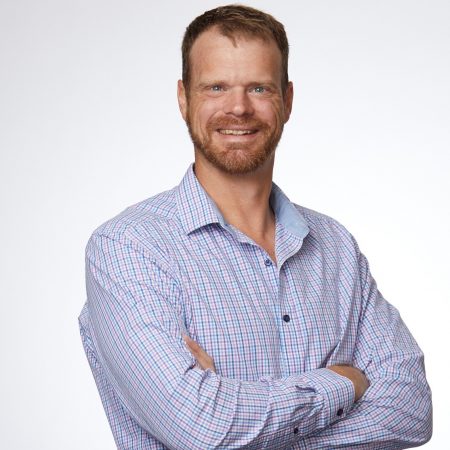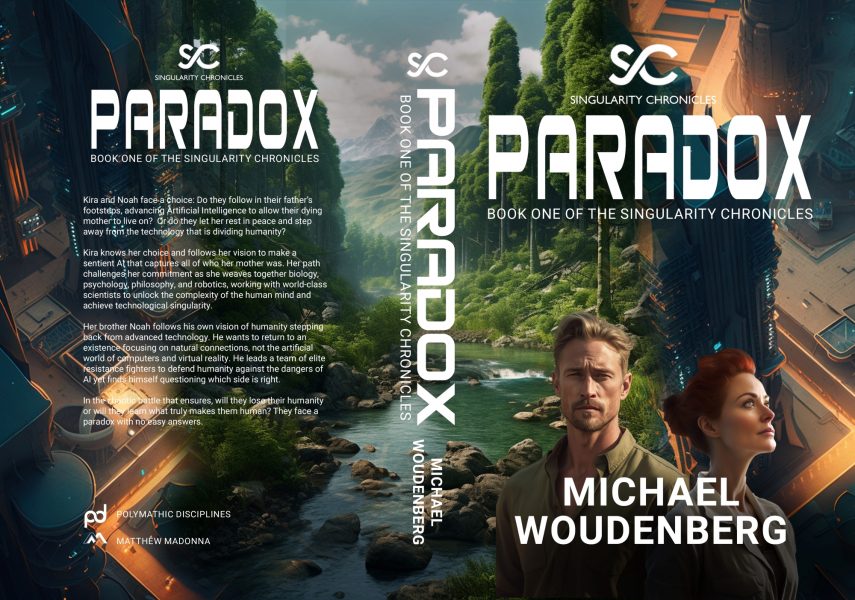Michael Woudenberg is a senior manager of software engineering at Chainalysis, based in New York City. He works remotely from Sahuarita, Arizona. Woudenberg graduated from Michigan Tech in 2005 with a degree in management information systems and was commissioned through the ROTC program. He spent six years in the US Army, climbing to rank of captain. Woudenberg went on work for Honeywell Aerospace, Raytheon, Lockheed Martin, and a variety of tech startups and has received several trade secret patent awards and innovation awards.
Woudenberg recently completed his first novel, Paradox, a science fiction work exploring advanced artificial intelligence and what it means to be human.
Following is a Q&A with Woudenberg on his latest project and ties to Michigan Tech.
Q: What spurred you to write a book?
A: I love the exploration of what it means to be human especially when confronted with ever-evolving technology. Too often we lose focus of what gives us superpowers as we see old careers, skills, and capabilities being replaced or automated. This book is an adventure diving into these topics. In the battle over advanced AI will we lose our humanity, or will we learn what really makes us human?
I’ve had the idea for this book since 2018 and it’s rooted in a group I was part of called Mixed Mental Arts which was focused on really learning what it means to be human. The original idea was to novelize these concepts to make them more accessible for people to pick up and enjoy while learning more about themselves. When AI started exploding this past year, I decided to take a sabbatical and knock out the book since it was exceptionally timely. Letting it set for a couple of years also allowed some of the technology to mature to a point where the storyline is even more fun than I originally thought.
Q: What was the timeline and process for completing the book?
A: As I mentioned, the idea started in 2018. I then ruminated over the ideas for a few years. Last year I started writing professional essays on Substack at www.polymathicbeing.com where I explore everything from technology to psychology, leadership, biomechanics, health, and much more. This created some of the technical and contextual underpinnings I then pulled from to write the novel while having much of the research already done. When I finally sat down and started cranking out the story it took me about four weeks of writing and another four of editing before I sent it off for professional review. Two months of writing; Five Years of prep.
What was the most fun was a comment someone told me as I started “Good writing should surprise the author.” I won’t deny, there were a lot of times as I wrote the book that I was surprised at how pieces fell together or plot twists emerged that naturally flowed vs. being designed in from the beginning. What I like most is the interplay between the two main characters Kira and her brother Noah. I didn’t know how it would play out since Noah is anti-AI and Kira is the one developing it. What I loved was how their relationship tension results in a series of twists and tangles that really move the adventure forward.
A lot of people ask whether I used AI to write a book about AI and the answer is Yes, but… I used ChatGPT to help kick me off of a blank page. It worked great as a collaborator in helping with character development, counter-arguments, descriptions from other perspectives, and more. The first chapter was started by ChatGPT but its a terrible writer. It did get me going and 22 chapters of my own writing later, I went back and ripped out all the AI-authored content because I had found my own voice. AI helped as an assistant but I learned that AI can’t replace good, unique, and insightful writing. (Just another part of what makes humans unique)
The cover art is AI-generated. Originally by me and then, with the prototype, perfected by my friend Matt Madonna. Like the writing, AI is a collaborator and it takes a lot of human effort to get it to work right. The cover is a compilation of four different images which we blended. The fun part is creating art beyond my expertise but being able to use my expertise with AI to do it. We did use Adobe Firefly to ensure the ethical use of art from licensed sources.
Q: What do you hope people take away from reading the book?
A: I’d really like people to walk away wondering which side they’d pick between pro or anti-AI. I’m still not sure if I’d be on Kira’s or Noah’s side. There are compelling arguments for both. I’d really hope that readers walk away with a better understanding of what really makes us human and what that means for us in the future as AI continues to be developed.
Q: Why did you choose to attend Michigan Tech?
A: The computer science program
Q: Tell us about a memorable experience you had with a class or about a favorite professor
A: And interesting experience was with Dr. Christa Walck on business psychology which I didn’t enjoy… Until years later. I remember buying the same book she had us use and then starting to study human psychology like crazy. I took a couple more of her classes and enjoyed them greatly.
Q: Now, how about a memorable experience outside of class?
A: For 5 years I lived at Michigan Tech, making the Keweenaw my home. I was highly involved with snowboarding, mountain biking, and all things outdoors. One summer I camped out in the woods outside Copper Harbor while working and biking.
Q: How well did Michigan Tech prepare you for your career?
A: Tech provides a unique experience that completely differentiates us from other engineering schools. It’s uniquely elite.
Q: What was your first job after graduation and how has your career progressed?
A: I commissioned from ROTC and went into the US Army. From there I’ve worked at Honeywell Aerospace, Raytheon, Lockheed Martin, and a variety of Tech Startups.
Q: What are a few of your career highlights and notable achievements?
A: I’ve been awarded several Trade Secret patent awards, numerous innovation awards, and have been published and given numerous symposium presentations across a variety of topics.
Q: Why do you share your time, talent, and treasure to support Michigan Tech students and/or alumni or volunteer in your community?
A: I’ve volunteered as a math tutor and keep myself busy with pro bono career coaching among a variety of other volunteer activities because being helped by others is how I was able to succeed in my undergrad and career in general.
Q: What advice on being successful would you give to Tech students and young alumni?
A: Be adaptable and agile in your studies and careers. The increasingly complex problems in technology and society will be solved by cross disciplinary and cross domain collaboration and not individual specialization alone.

